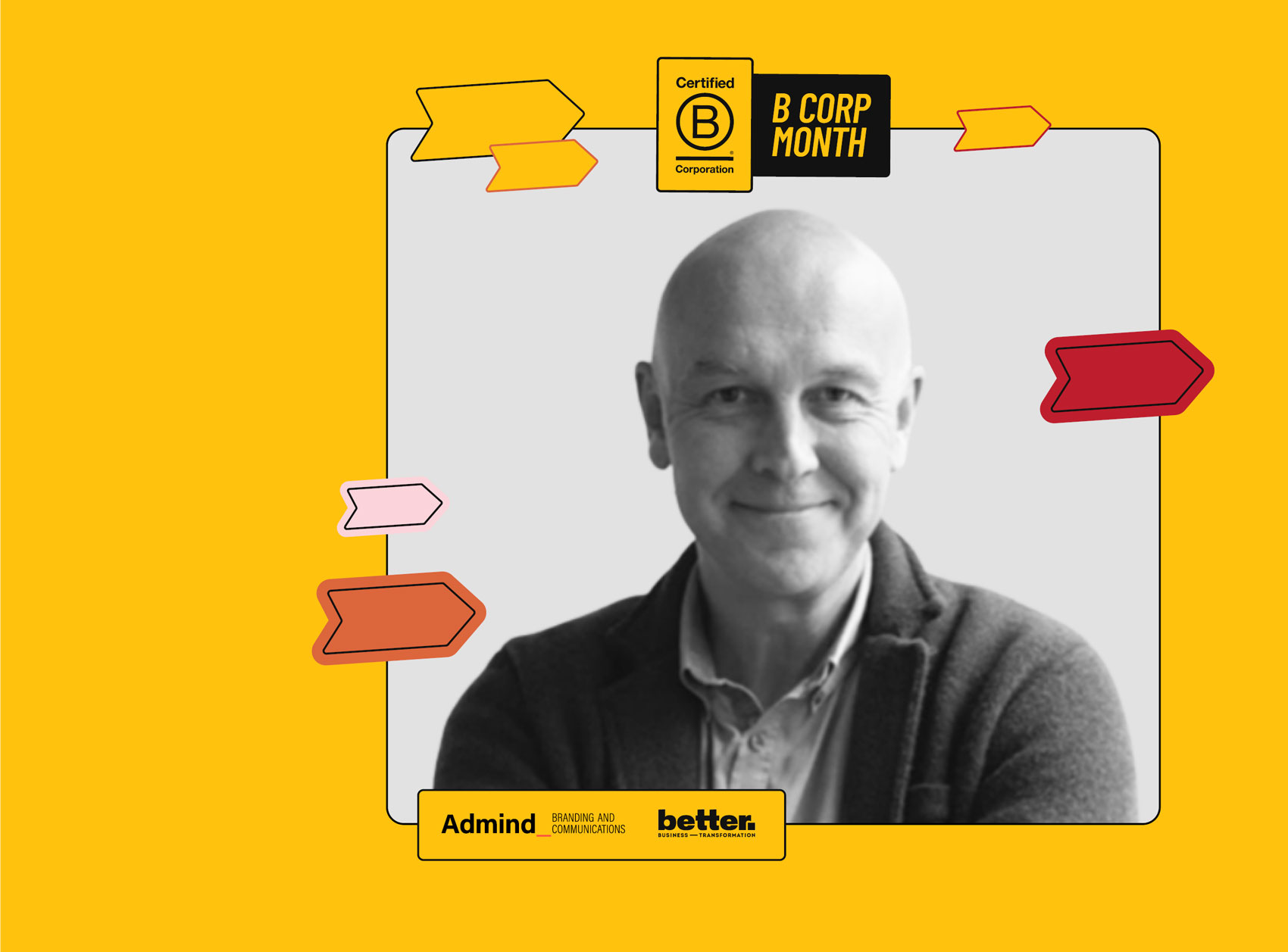In the face of growing environmental and social challenges, companies worldwide are faced with the need to adapt and change. The concept of socially and environmentally responsible business that seeks to make a positive impact on the world, not just a profit, is becoming critical. In this context, B Corp certification is emerging as a key turning point for companies looking to make this change.
Olga Lany, PR & Partnership Manager at Admind Branding & Communications, in conversation with Paweł Niziński, co-initiator of the B Corp movement in Poland and CEO of BETTER – a company specializing in business transformation, delves into the secrets of the certification process, its significance and the challenges of transformation towards sustainable development.
Olga Lany: When and how did you find out about B Corp?
Paweł Niziński: In 2015, when Goodbrand, to which we belonged at that time, started the certification process in the UK market. It turned out that our activities in the area of sustainable agriculture or strategic support for actions such as the “Share a Meal” – program of Danone, which we implemented in Poland, were included in the global impact report, which was a result of the B Corp certification. Goodbrand was listed among the top one hundred companies in the world at the time of its first certification, so it really sparked the imagination.
Then my friendship with Marcello Palazzi, one of the founders of the B Corp movement in Europe, led to me being asked to help build the movement in Poland. At the same time, the lawyer Wojciech Bagiński was already working on the certification of the first Polish B Corp – Benefit Systems. It’s a very large company, which is a challenge for the certification process. So we met and together we tried, each in our own way, to promote the movement, Wojtek eventually as an expert and director at B Lab Global and I as a country partner in Poland.
OL: I remember you mentioned recently that there is a somewhat unusual situation in Poland in terms of awareness of the B Corp brand versus the level of certification. Could you explain that?
PN: It’s actually quite interesting. I think this situation reflects our Polish spirit well because it turns out that we have one of the highest levels of B Corp awareness in Europe. This is a very big achievement, given the practically organic growth, not supported by information campaigns. And yet there are relatively few local certificates. There are active brands such as Too Good To Go, Illy coffee, Nespresso, Chiesi, Camper and Rituals, which are starting the certification process locally from a global perspective, or the Danone Group, which has been moving towards certifying all its operations worldwide for several years. With several dozen B Corps present in Poland, those that have grown organically in Poland are still few. We started later, and we also have a different perception of certificates in business than in Europe.
OL: And what does it look like in Europe?
PN: In France, Italy, Benelux, and Spain, hundreds of companies have achieved B Corp certification. Over 1500 in the UK! Over 100 in the Scandinavian countries or Germany. Against this background, our Polish dozen seems really small, although several hundred Polish companies have approached the B Impact Assessment process. I hope that they will use this tool in the process of transforming their business models, products, and impact on society and the natural environment and that it will eventually lead to a larger B Corp community.
OL: Exactly. I’ve recently been reviewing materials developed by various activists online that question B Corp certification, but ultimately conclude that there is nothing better in the world in this area. You can trust different certifications or you can’t, but there’s nothing else like B Corp that actually forces real change. What’s more, it’s not awarded once and for all; you have to constantly fight to maintain its values and indicators in a dynamically changing world.
PN: Indeed. Certification can even be withdrawn if a company goes down the wrong path and becomes the subject of documented public discourse – there have been such cases, although the assessment is so thorough, demanding, and detailed that it allows for trust in certified companies. It’s a constantly improving process, we’re currently in our sixth version, and I remind you that the B Corp movement is only a few years old, since 2006.
OL: Do you think that the reason why Polish companies are not rushing to become a B Corp is because of the effort required or simply because of a lack of willingness to change?
PN: What certifications are they “rushing” for? B Corp is treated as one of many certifications, and companies approaching it don’t know it’s so demanding; they also don’t know it can serve as a tool to transform their business in the spirit of ESG. To answer your question: I think it’s a little bit of both. On the one hand, European legislation has created panic with ESG reporting requirements. Suddenly, almost 4,000 companies have to report under the CSRD directive. This means that companies do not really know how to go about it at the moment, there are not enough experts to help. Clearly, the market is reacting – just look at professional profiles and how many people now mention ESG. But besides the panic, there’s also a real awareness that we have a lot to do in terms of environmental issues, social issues, corporate governance, organizational culture, and DEI.
Sometimes these feelings do not reflect the real picture. We think we’re very backward and lacking in many of the practices desired by such certifications, but a closer look at what we’re actually doing might reveal that we’re not that far off. That we have a lot to say about good practices in this area, that we could be much more present with our voice in the European discourse. I look with great satisfaction at the number of events in different business environments, how the topic of sustainable development is present everywhere. We have a rapidly growing circle of highly specialized experts who really have something to say. And we have been able to make a substantial contribution to what’s happening in Europe. This is taking place on a small scale. There are people like Piotr Biernacki from Materiality, representatives of the Big Four, the Association of Stock Exchange Issuers, UNEP GRID, who are heard and even influence the creation of these standards (within the EFRAG organization). However, I think it’s really not much and our voice could be much more audible.
OL: I wonder if the moment that ESG reporting regulations force some companies to make an effort and implement standards, they might want to go a step further. Is there a chance that companies will see ESG reports as a warm-up and decide to go for B Corp certification, for example?
PN: It might even be the other way around – they might be going for B Corp certification to make sure they can meet ESG challenges! I strongly believe in such a healthy mix: regulations coming from authorized institutions, the legal system, and a healthy assessment of the situation and market analysis. I think in Poland we have a very strong aspirational model of building our presence in business. We have a good sense of trends and we want to catch up. We don’t want to fall behind and we are ready to work at a higher level. We also understand that if we don’t start doing that, we will no longer be competitive. We’ll disappear from the market.
I recently had a very interesting conversation with a representative of a B Corp, specifically a fund:
“Why do you need this certification? After all, funds are the most bloodthirsty part of capitalism, impact investment is still a big challenge in Poland, wouldn’t it be better just to count short-term investment returns?”.
“Think about it, if we invest now in a company that doesn’t have R&D focused on sustainable development, doesn’t have an inclusive culture, and has weak corporate governance. Three years from now, when we want to sell that company back to the market, it may turn out to be unsellable because it will be absolutely behind. So we’re looking for those that are companies of the future, that are already built on purpose and sustainability.
That’s very interesting. We have to pay attention to what smart investors are saying because that sets the direction of the market.
OL: I’ve met company representatives who complain about the need for ESG reporting. That it’s an extra burden, and they have to hire someone to do it, and they don’t know how to do it. They treat it as a nuisance, as a ball and chain, not as a business opportunity.
PN: I think the market is split between these antipodes. On the one hand, there’s the area of compliance, i.e. meeting regulatory requirements: I have to have ESG in the company and I have to report. If I don’t, there will be legal consequences, fines, I will be red-flagged in my customers’ value chain, and I may lose them, panic. Focus on compliance.
But there’s also a growing group of companies that are taking a different approach, and that’s the other end of this continuum. Business models that focus on consciously managing their positive impact. This is where competitive advantage, credibility and trust are built. The civilizational challenges we face today force us to reimagine capitalism, which in its Friedmanesque form provides no answers on how to deal with these challenges. More conscious business leaders will simply expect their partners to cooperate in this much more important, long-term goal – building an economy that regenerates resources and includes previously marginalized groups.
Is this awareness widespread? Of course not. Look at what happened during the recent vote on the Due Diligence Directive. First, the votes of Italy and Germany slowed down its passage through the European Parliament. At the same time, smaller states, who probably didn’t really know how to vote, helped to sideline it. We’re debating changes to the Green Deal, and the solutions adopted don’t take into account all the circumstances, such as social discontent or populist movements based on it. But the direction of change is still the same – we need to repair capitalism and regenerate the planet’s resources, respect human rights.
I’m very afraid that ESG will be a temporary victim of the upcoming European Parliament elections because it will be a field for populist parties to criticize those who are progressive and focused on long-term change. So it’s probably going to go in waves. Right now there is probably a wave of a return to short-term thinking in terms of generating investment returns. People sometimes really forget that you can’t do business on a dead planet. But the advancing phenomena of the climate crisis will act as a warning, reminding us that change is necessary and the direction is already set.
OL: Finally, the most difficult question: If you could use one sentence to encourage a company to make the effort, not to get the certificate, but to enter into conscious transformation with an open mind, what would it be?
PN: As you probably remember Jack Trout, who once wrote, “Differentiate or die,” I would like to say, “Transform or die.” It takes effort, but it offers a chance to survive.
OL: I also have a great and relevant quote – by Tadeusz Kantor “You cannot always be on the wave – you have to be the wave…”.
PN: It’s worth returning to Kantor. I’m lucky that I saw “Wielopole”, “The Dead Class”, “Where are the snows of yesteryear”…
OL: I’m envious!
PN: And just like that, the longer answer is probably that change is inevitable and it’s better to be the one who creates the change.



